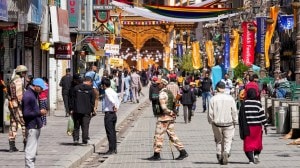Can you hear the women?
When women begin to agitate, it should be time to sit up and take note. When women came out in large numbers during Gandhiji’s salt sat...

When women begin to agitate, it should be time to sit up and take note. When women came out in large numbers during Gandhiji’s salt satyagraha, the movement acquired a mass character. When women emerged on the streets in Srinagar in ‘89, they gave a new twist to the struggle for secession.
Last week a few hundred women owned up in the Nagpur court that they had killed the dreaded criminal Akku Yadav. They were seeking the release of four of their compatriots arrested for lynching the serial rapist in court. Not enough details are available about the episode but what is becoming clear is the official-criminal nexus, and the collapse of the legal-judicial system which should come as a wake-up call to all. Though all this was happening in the heart of Vidarbha where a bitter election will be fought next month, mainstream political parties seemed oblivious of its import.
This is precisely what happened in Manipur last month. The midnight arrest of Manorama Devi, her rape and the discovery of her body in the fields at daybreak, was bound to touch off a hornet’s nest. Even if the cynics dismissed it as one more casualty in the insurgent-ridden state, what followed four days later was unprecedented and should have galvanised the government, political parties, NGOs, women’s organisations. Twelve women stripped in front of the headquarters of Assam Rifles. Though Manipur has a long history of women’s activism, the nature of their protest showed the depth of their desperation. But the rest of India failed to reach out to Manipur’s women.
On that day, the prime minister should have rushed to Imphal. Sonia Gandhi could have gone, or the home minister or defence minister. A visit by a senior person would have expressed an understanding of the women’s anguish and shown the Centre cared, even if it could not find immediate solutions. But the government chose to wait and watch. There was the extraordinary spectacle of the home minister telling parliament that Chief Minister Ibobi Singh had flouted the government’s directive — after Amarinder Singh he is the second Congress CM to cock a snook at the Centre — when he decided to partially lift the AFSPA in Imphal.
Politics is about communication with the people. When Indira Gandhi rushed to Biharsharief on May 4 1981, she left within a couple of hours of hearing that communal riots had broken out in the Bihar town. She was briefed at 10 am by the director, Intelligence Bureau; at 1 pm her plane had taken off. This compelled Jagannath Mishra, then CM of Bihar, and who was continuing with his planned programme, to rush to Biharsharief. By the time she returned to Delhi, it was 10.30 pm. Members of the Congress Parliamentary Board which was scheduled to meet at 6 pm, were waiting for her. The CPB finished its meeting at 3 am and the PM was off again at 6 am to Geneva on a foreign trip, briefing aides on the way to the airport.
Similarly, when she went to Belchi, a remote village in Bihar where Dalits had been killed, no one offered the argument advanced this time on Manipur — that her visit would achieve little that could not be done by the district magistrate or local authorities. She was not even in power in 1977. The village was so inaccessible she covered the final lap on an elephant. Belchi became synonymous with the rise of Dalit consciousness and set in motion the comeback of Indira Gandhi.
There are moments when it is important to seize the opportunity. Once they are lost, whatever you do seems too little too late. Over the last two decades, the armed forces have fought and continue to fight a difficult battle with the insurgents in Manipur. The Armed Forces Special Powers Act allows for immense powers like arrest without a warrant, enabling even a junior non-commissioned officer to shoot to kill. But even such a law lays down the limits of power. But these are being crossed. Even if Manorama was a member of the insurgent People’s Liberation Army, and that is a defence that has been offered for what happened, it does not justify rape or killing.
Certainly, the AFSPA needs a fresh look. What is needed, above all, is to listen to what the women of Manipur have to say. A political approach is needed, which is not the same as a partisan or a party approach. We cannot mess around with India’s peripheries. Remember, it did not take very long for the anti-Centre movement in J&K to transform into a struggle for ‘‘azadi’’. Be it Nagpur or Manipur, they are illustrative of the collapse of the structures of governance. The increasing lawlessness we are witnessing has been aggravated by a lack of concern at the top, and the growing disconnect between leaders and the people.



- 01
- 02
- 03
- 04
- 05



























